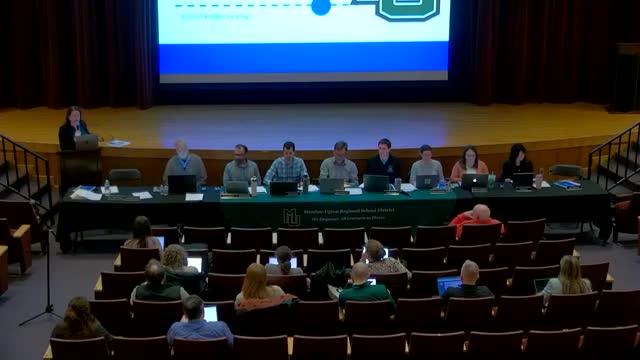Mendon-Upton school committee certifies $42.17 million FY26 budget, leans on reserves and school choice to close gap
Get AI-powered insights, summaries, and transcripts
Subscribe
Summary
The Mendon-Upton Regional School District School Committee on March 10 certified a $42,170,584 operational budget for fiscal year 2026 and approved six motions setting town assessments and appropriations.
The Mendon-Upton Regional School District School Committee on March 10 certified a $42,170,584 operational budget for fiscal year 2026 and approved six related appropriation and assessment motions, adopting the package by voice vote.
Dr. Maureen Cohen and Jay Beyer, who presented the budget, told the committee the district had closed an almost $1.8 million shortfall by combining one‑time resources, transfers from revolving accounts and increased use of school‑choice funds. Committee members then read and voted on six formal motions that set the operational budget, the towns’ assessments, and several appropriations.
Why it matters: the committee and presenters described a multi‑year trend of flat state aid and rising fixed costs — health insurance, transportation and special‑education placements — that is pushing the district toward greater reliance on reserves and one‑time funds. Presenters warned this is not sustainable long term and described the district as approaching a “fiscal cliff” if revenue conditions do not improve.
Key budget details presented by the district: enrollment was reported at 2,072 students with roughly 403 staff. Employee salaries and benefits account for roughly 77% of the budget. State Chapter 70 aid in the governor’s budget was described as a small per‑pupil increase (the governor’s proposal included $75 per student at the time of presentation) but presenters emphasized final state numbers remain uncertain until the Legislature and governor act later in the spring and summer.
How the shortfall was closed: the presenters said the district will use $1,400,000 from the school‑choice revolving account, appropriate $1,000,000 from Excess and Deficiency (E&D) reserves, transfer $325,000 from revolving accounts, and apply roughly $500,000 of carryover IDEA (240) grant funds for special‑education staffing. They also reduced the number of proposed new positions from five to three and cut supply accounts.
Town assessments and appropriations: the committee approved motions that set the operational budget at $42,170,584 and specified assessments to the towns. The motions read into the record allocated the district’s assessed share as follows: Mendon — $11,046,820 (broken out in the motion as minimum local contribution $8,861,322; nondiscretionary $787,501; discretionary $1,398,005) and Upton — $14,672,492 (minimum local contribution $11,682,753; nondiscretionary $1,077,290; discretionary $1,912,449). The motions also appropriated $14,901,264 in state aid (Chapter 70, transportation, charter reimbursement) and $1,550,000 from district sources including E&D and revolving transfers.
Committee and public questions: presenters and committee members discussed several revenue drivers: transportation reimbursement (noted historically funded at well below the statutory 100% and variable year to year), charter‑school tuition reimbursement, circuit‑breaker special‑education reimbursements, and school‑choice tuition. A member of the public identified as Paul from the Upton finance committee asked for explanation of how the state calculates minimum local contributions; presenters summarized that the state uses measures including property values (equalized valuation), local income and municipal revenue growth factors to determine a town’s target share. Presenters noted Upton remained below its state target share and therefore faced a larger minimum local contribution increase in FY26, while Mendon was reported at or near its target share.
Capital and facilities: the presentation also covered capital needs, including an MSBA‑accepted roof replacement project at Nipmuc with an estimated total project cost presented at roughly $8 million (district estimate) and an estimated MSBA reimbursement around 50%. District presenters described a broader facilities and athletics package — building upgrades, HVAC and building‑management systems, and athletic‑field work — with total estimated costs given in the presentation near $30 million across all projects. Presenters said costs were preliminary and that town votes and borrowing would be required for some items.
Conflict of interest disclosure: one committee member disclosed a conflict of interest because a spouse works as a teacher at Memorial; that member said they had sought state ethics advice and would abstain from any discussion or vote relating to the specific budget line items that directly affect that spouse’s financial interests.
Formal actions and outcome: the committee voted to adopt the six motions read into the record (operational budget, Mendon and Upton assessments, state aid appropriation, district appropriations from E&D and other sources, and transfers from revolving accounts). The motions were approved by voice vote.
What remains uncertain: presenters listed several variables that could change the final picture, including the House and Senate versions of the state budget, final transportation and circuit‑breaker reimbursements, actual school‑choice enrollment next year, kindergarten and general enrollment shifts, and final federal grant awards. Presenters and committee members repeatedly cautioned the district is using one‑time funds that are unlikely to be available at the same level in FY27.
The committee closed the public hearing and proceeded to the vote to certify the budget package; the motions were passed by voice vote during the March 10 meeting.
